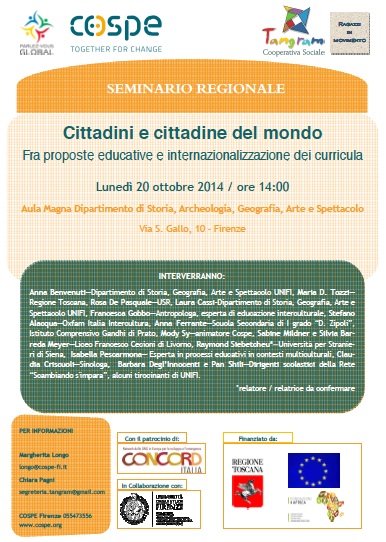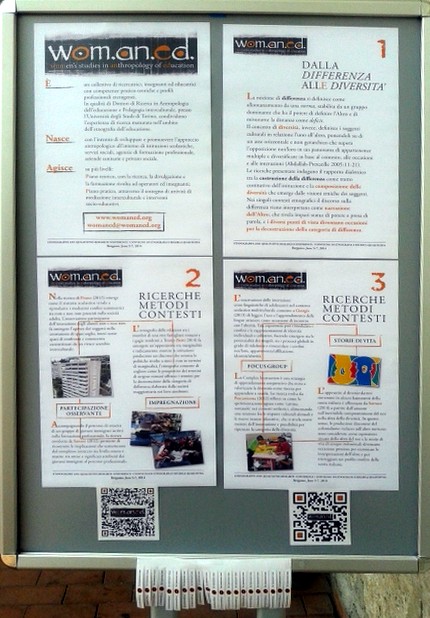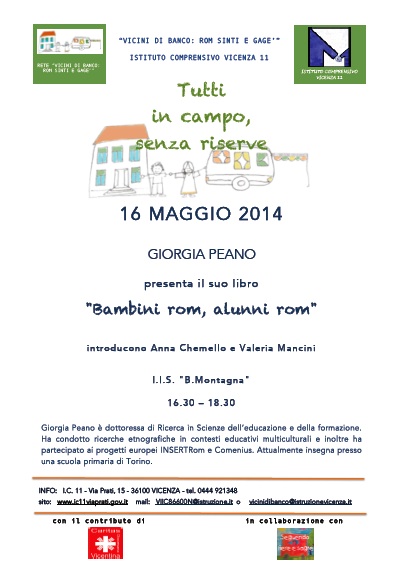2018, July, 23-26, Landau, Germany: 38th LAUD Symposium/Second Cultural Linguistics International Conference (CLIC), University of Koblenz-Landau.
Critical Cultural Linguistics: How language conceptualizes and (re)produces Otherness – and how such processes can be problematized and challenged
Paola Giorgis
Cultural Linguistics analyses the relation between language and cultural conceptualizations, studying how linguistic interactions influence the development of cultural conceptualizations, and, at the same time, how language structure and use draw on and reflect cultural conceptualizations. Yet, if cultural conceptualizations are encoded and embodied in language, they are by no means neutral or accidental. Therefore, within the Cultural Linguistics framework, a promising field of enquiry is Critical Cultural Linguistics (CCL) which analyses how cultural conceptualizations are shaped by contexts, conditions, power relations, unequal access to cultural and natural resources, as well as by socio-cultural and historical factors. Studies within the perspective of CCL can cast a light on what lies behind cultural conceptualizations and on how language can (re)produce or challenge them. Being critical, CCL should look at interdisciplinarity as one of its most prominent features, as it is only by interconnecting elements and perspectives, as well as research and practices, that phenomena can be read in their complexity. CCL can therefore become an exercise in interdisciplinarity, possibly developing a new methodological paradigm where scholars, researchers, educators, and practitioners from different fields can work together.
I will therefore discuss CCL’s potential from an interdisciplinary perspective, first offering some examples of how language conceptualizes and (re)produces Otherness, and then how a critical approach to Foreign Language Education can problematize and challenge it. I will start examining how, in Gulliver’s Travels, Jonathan Swift reflects on Otherness precisely through addressing language and cultural conceptualizations. I will then present a few cases of how cultural conceptualizations of Otherness are historically, culturally and geographically situated, and the much too short a step between the cultural conceptualization of the Other and the cultural conceptualization of the Enemy.
I assume that the cultural conceptualizations of Otherness are processes of categorizations which can easily fall into the stereotyping of cultural features as static and homogeneous traits of some groups. I will then present an actual activity made with my students in an English Language classroom in Italy aimed at problematizing and challenging such processes. Starting from how ‘we’ are seen by ‘others’, I invited students to reflect on how they felt about such ascriptions, and discuss their opinions in the foreign language. One intent was to use the foreignness that foreign languages foreground to reflect on pre-given assumptions on languages and cultures – one’s own included. The fact that English was a language foreign to all students put them all, both native Italian and non-native Italian, in a common condition of disadvantage as it depended on factors which had nothing to do with national or ethnic descent. Then, by detaching students from their mother tongue, the experience of a foreign language allowed them to develop a meta-linguistic awareness of how far linguistic and cultural features and conceptualizations are situated and constructed. The outcome of this activity put into evidence how far CCL can become a very promising field for both critical language education and critical intercultural communication.
Link: https://www.uni-koblenz-landau.de/de/landau/fb6/philologien/anglistik/laudsymposium

2018, March, 22-24, Freiburg, Germany: FOL – Focus on Languages, Pëdagogische Hochschule, University of Freiburg.
Speaking Diversely, Learning Diversity. How a Critical and Intercultural Approach to Foreign Language Education can work for Peace and Global Education
Paola Giorgis
Considered “the prime promoter of the foreign perspective” (Kramsch 2009), Foreign Language Education can disclose how far the relation word-world is cultural and situated, favouring a critical and intercultural perspective able to question the taken-for-granted of individual and collective cultural identitities, and encouraging a wider understanding of linguacultural diversities.
Within such a framework, English as a Foreign Language exposes its contradictions. At the intersection of global phenomena and local appropriations, of norms and variations, of homogenization and subversion, English has triggered fierce debates on the linguistic, sociocultural, political and pedagogical implications of its widespread, but also on the potentially creative and critical appropriations from below that it can elicit. Yet, precisely for its multifaceted quality and the controversies it arises, it can propose renovated critical pedagogies of foreign languages, engaging teachers and students to discuss issues of power and how individual and collective representations of culture and identity manifest and move through language affiliations and appropriations.
In the light of Critical Linguistics and Pedagogy, Anthropology of Education, and Intercultural Education, I will address these issues presenting a qualitative field study in two educational contexts with adolescent students from different linguacultural backgrounds examining the critical and intercultural potential of English as a Foreign Language in the Italian multicultural context. I will also present an actual classroom activity on Global and Intercultural Citizenship to show how a critical approach to Foreign Language Education can challenge and dismantle pre-given assumptions on individuals and groups, favouring the students’ individual sense of belonging to a wider world, and therefore working for Peace and Global Education.
Link: http://focusonlanguage.eu/focus_on_language_conference/

2017, October, 2- 6, Turin, Italy
Organizing Committee of the 9th Annual International Congress of the International Institute for Critical Pedagogy and Transformative Leadership – Project Freire
Paola Giorgis & Rebecca Sansoé

2016, 20-23 October, School of Education, Durham University, Durham, UK: International Conference “Education and Migration: Language foregrounded”, Researching Multilingually at the Borders of Language, the Body, Law and the State.
Teaching and learning foreign languages in multicultural and plurilingual contexts: A critical and intercultural approach to foreign language education
Paola Giorgis
Link to PPT Presentation: http://researching-multilingually-at-borders.com/wp-content/uploads/2016/04/GIORGIS.pdf
Researcher’s Link: https://researching-multilingually-at-borders.com/?page_id=1818


20 ottobre 2014
CITTADINI E CITTADINE DEL MONDO
Fra proposte educative e internalizzazione dei curricula
WORKSHOP: Dalla rilevazione alla valorizzazione delle competenze di cittadinanza
Coordina: Carlo Testi - dirigente scolastico
Intervento: Gli strumenti dell'apprendimento cooperativo
di Isabella Pescarmona, Esperta in processi educativi in contesti multiculturali


Bergamo 5-7 giugno 2014
wom.an.ed. ha partecipato al convegno:
ETHNOGRAPHY AND QUALITATIVE RESEARCH CONFERENCE
5th Edition
Piazzale Sant’Agostino, 2 & Via Pignolo, 123 Bergamo BG - Italy
Info: http://www.etnografiaricercaqualitativa.it/?p=162


Vicenza 16 maggio 2014
INCONTRO CON GIORGIA PEANO
Introducono Anna Chemello e Valeria Mancini
Presso IIS B. Montagna
Per il progetto Tutti in campo senza riserve! Rom Sinti: vicini di banco
Il progetto è promosso dall’Assessorato alla Formazione in collaborazione con Caritas e Opera Pia Cordellina e con la Rete “Vicini di banco: Rom Sinti Gagè”, nata nell’anno scolastico 2012-2013 con lo scopo di mettere in comunicazione le scuole di tutta la provincia aventi alunni iscritti rom/sinti.
